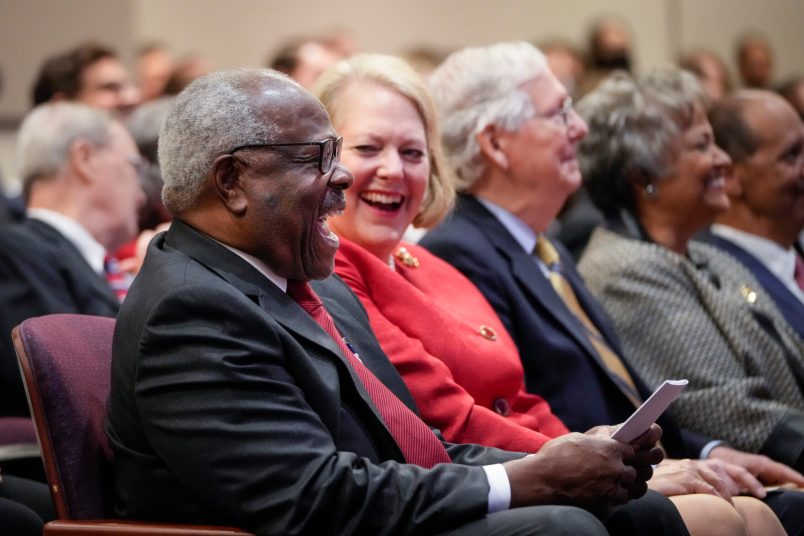This article first appeared at ProPublica. ProPublica is a Pulitzer Prize-winning investigative newsroom. Sign up for The Big Story newsletter to receive stories like this one in your inbox.
A Washington ethics watchdog is calling for the Department of Justice to investigate Supreme Court Justice Clarence Thomas for failing to disclose luxury trips he received from a billionaire GOP megadonor.
“This high-profile ethics matter has historic implications far beyond one Supreme Court justice,” attorneys for the nonpartisan Campaign Legal Center wrote in a detailed letter on Tuesday to the Judicial Conference, the principal policymaking body for federal courts. The Judicial Conference could trigger an investigation by referring the case to the Justice Department.
The financial disclosure law that covers justices and other federal officials states that “knowingly and willfully” failing to make required disclosures can result in fines. If someone intentionally falsifies their disclosure reports, they can face criminal penalties — a warning printed below the signature line of the reports themselves. But such prosecutions are rare.
ProPublica’s investigation last week revealed that Thomas has taken international cruises on conservative donor Harlan Crow’s superyacht, flown on Crow’s private jet and regularly vacationed at Crow’s private resort in the Adirondacks.
If the Judicial Conference were to refer the case to the Justice Department, it could lead to a remarkable historical moment. One of the few instances of a federal investigation into a sitting Supreme Court justice occurred in 1969, when Justice Department officials signaled an inquiry into outside payments that Justice Abe Fortas had been accepting. Fortas eventually resigned.
Lawyers for the Campaign Legal Center, which was founded by a former Republican chairman of the Federal Election Commission and pushes for tighter ethics enforcement in Washington, wrote that there’s ample “reasonable cause to believe that” Thomas knew the trips had to be disclosed.
“If the Judicial Conference fails to publicly address the substantial evidence of blatant violations of a disclosure law that other federal judges understand and regularly follow,” the attorneys wrote, “it creates an exception for Justice Thomas that swallows the rule.”
The Judicial Conference and Thomas did not immediately respond to requests for comment. The Justice Department declined to comment.
The letter is the latest in what have been days of mounting pressure to address the revelations. Last week, Democratic lawmakers called on Chief Justice John Roberts to investigate. This Monday, Democrats on the Senate Judiciary Committee announced plans to hold a hearing “regarding the need to restore confidence in the Supreme Court’s ethical standards.” They also announced an effort to reform ethics rules for federal judges.
In response to our story last week, Thomas issued a statement acknowledging the “family trips,” which he said he was told that he didn’t need to report.
“Early in my tenure at the Court, I sought guidance from my colleagues and others in the judiciary, and was advised that this sort of personal hospitality from close personal friends, who did not have business before the Court, was not reportable,” Thomas wrote. “I have endeavored to follow that counsel throughout my tenure, and have always sought to comply with the disclosure guidelines.”
Seven experts consulted by ProPublica, including former ethics lawyers for Congress and the White House, said the law clearly requires the disclosure of gifts of transportation, such as private jet flights. If Thomas is arguing otherwise, the experts said, he is incorrect. Among the experts was a top official at the Campaign Legal Center.
Crow acknowledged that he’d extended “hospitality” to the Thomases “over the years.” He said that Thomas never asked for any of it and it was “no different from the hospitality we have extended to our many other dear friends.”
Attorneys with the center said that the federal Ethics in Government Act and judiciary regulations have always required the disclosure of free travel — even before the regulations were updated last month. They argued that Thomas himself implicitly acknowledged as much when he disclosed similar flights in the late 1990s, including one on Crow’s jet.
The attorneys pushed for the Judicial Conference to make good on its recent promises to “ensure timely action is taken on credible allegations of misconduct” and refer Thomas’ case to the Justice Department before the next judicial ethics disclosure deadline in May.



